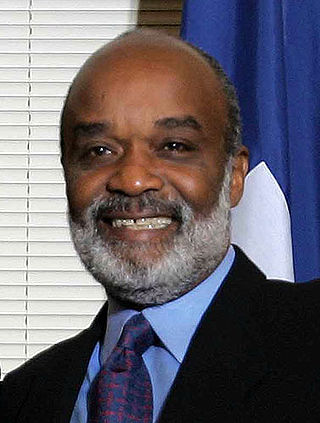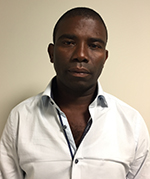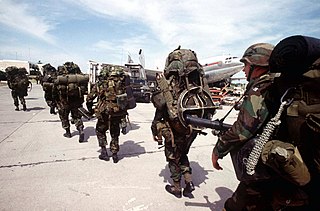Related Research Articles
The recorded history of Haiti began in 1492, when the European captain and explorer Christopher Columbus landed on a large island in the region of the western Atlantic Ocean that later came to be known as the Caribbean. The western portion of the island of Hispaniola, where Haiti is situated, was inhabited by the Taíno and Arawakan people, who called their island Ayiti. The island was promptly claimed for the Spanish Crown, where it was named La Isla Española, later Latinized to Hispaniola. By the early 17th century, the French had built a settlement on the west of Hispaniola and called it Saint-Domingue. Prior to the Seven Years' War (1756–1763), the economy of Saint-Domingue gradually expanded, with sugar and, later, coffee becoming important export crops. After the war which had disrupted maritime commerce, the colony underwent rapid expansion. In 1767, it exported indigo, cotton and 72 million pounds of raw sugar. By the end of the century, the colony encompassed a third of the entire Atlantic slave trade.

Jean-Bertrand Aristide is a Haitian former Salesian priest and politician who became Haiti's first democratically elected president in 1991 before being deposed in a coup d'état. As a priest, he taught liberation theology and, as president, he attempted to normalize Afro-Creole culture, including Vodou religion, in Haiti.

René Garcia Préval was a Haitian politician and agronomist who twice was President of Haiti, from early 1996 to early 2001, and again from mid-2006 to mid-2011. He was also Prime Minister from early to late 1991 under the presidency of Jean-Bertrand Aristide.

A coup d'état in Haiti on 29 February 2004, following several weeks of conflict, resulted in the removal of President Jean-Bertrand Aristide from office. On 5 February, a rebel group, called the National Revolutionary Front for the Liberation and Reconstruction of Haiti, took control of Haiti's fourth-largest city, Gonaïves. By 22 February, the rebels had captured Haiti's second-largest city, Cap-Haïtien and were besieging the capital, Port-au-Prince by the end of February. On the morning of 29 February, Aristide resigned under controversial circumstances and was flown from Haiti by U.S. military and security personnel. He went into exile, being flown directly to the Central African Republic, before eventually settling in South Africa.

Guy Philippe is a Haitian former police officer, politician, and convicted money launderer, who led the 2004 Haitian coup d'état against president Jean-Bertrand Aristide after being fired from the police in 2000.
The National Revolutionary Front for the Liberation and Reconstruction of Haiti was a rebel group in Haiti that controlled most of the country following the 2004 Haitian coup d'état. It was briefly known as the "Revolutionary Artibonite Resistance Front", after the country's central Artibonite region, before being renamed on February 19, 2004, to emphasize its national scope.

Operation Uphold Democracy was a multinational military intervention designed to remove the military regime led and installed by Raoul Cédras after the 1991 Haitian coup d'état overthrew the elected President Jean-Bertrand Aristide. The operation was effectively authorized by the 31 July 1994 United Nations Security Council Resolution 940.
Antoine Izméry was a Haitian businessman and pro-democracy activist.

The United Nations Stabilisation Mission in Haiti, also known as MINUSTAH, an acronym of its French name, was a UN peacekeeping mission in Haiti from 2004 to 2017. It was composed of 2,366 military personnel and 2,533 police, supported by international civilian personnel, a local civilian staff, and United Nations Volunteers. The mission's military component was led by the Brazilian Army and commanded by a Brazilian.
Jacques Roche, a Haitian journalist and editor for Le Matin newspaper and a host of a TV show in Port-au-Prince, Haiti, was kidnapped, tortured and killed during a wave of abductions carried out before elections. Roche was affiliated with Group of 184 and an opponent of Jean-Bertrand Aristide and his Fanmi Lavalas political party and pro-Lavalas were suspected of carrying out his murder.
Kevin Pina is an American journalist, filmmaker and educator. Pina also serves as a Country Expert on Haiti for the Varieties of Democracy project sponsored by the University of Notre Dame Center for Research Computing, the University of Gothenburg Department of Political Science, and the Helen Kellogg Institute for International Studies.

General elections were held in Haiti on 7 February 2006 to elect the replacements for the interim government of Gérard Latortue, which had been put in place after the 2004 Haiti rebellion. The elections were delayed four times, having originally been scheduled for October and November 2005. Voters elected a president, all 99 seats in the Chamber of Deputies of Haiti and all 30 seats in the Senate of Haiti. Voter turnout was around 60%. Run-off elections for the Chamber of Deputies of Haiti were held on 21 April, with around 28% turnout.
Jean-Claude Bajeux was a Haitian political activist and professor of Caribbean literature. For many years he was director of the Ecumenical Center for Human Rights based in Haiti's capital, Port-au-Prince, and a leader of the National Congress of Democratic Movements, a moderate socialist political party also known as KONAKOM. He was Minister of Culture during Jean-Bertrand Aristide's first term as President of Haiti.

Charles-Henri Jean-Marie Baker is a Haitian industrialist and presidential candidate. He is a former member of the Group of 184. Baker was a candidate for president in Haiti's 2006 and 2010 elections.
Emmanuel Wilmer was a Haitian criminal, rebel, and anarchist killed in a United Nations armed assault on Cité Soleil that killed dozens of people. The assault was led by Brazilian general Augusto Heleno and was carried out by COMANF on July 6, 2005. Cité Soleil, the location where the assault occurred, was largely governed by Aristide-backed gangs affiliated with Fanmi Lavalas who monitored visitors via two roads that accessed the slum.

Cité Soleil is an extremely impoverished and densely populated commune located in the Port-au-Prince metropolitan area in Haiti. Cité Soleil originally developed as a shanty town and grew to an estimated 200,000 to 400,000 residents, the majority of whom live in extreme poverty. The area is generally regarded as one of the poorest and most dangerous areas of the Western Hemisphere and it is one of the biggest slums in the Northern Hemisphere. The area has virtually no sewers and has a poorly maintained open canal system that serves as its sewage system, few formal businesses but many local commercial activities and enterprises, sporadic but largely unpaid for electricity, a few hospitals, and two government schools, Lycée Nationale de Cité Soleil, and École Nationale de Cité Soleil. For several years until 2007, the area was ruled by a number of gangs, each controlling their own sectors. But government control was reestablished after a series of operations in early 2007 by the United Nations Stabilization Mission in Haiti (MINUSTAH) with the participation of the local population.
Lieutenant-General Urano Teixeira da Matta Bacellar was a Brazilian soldier. He was born in Bagé in the state of Rio Grande do Sul. He served for 39 years in the Brazilian Army and eventually rose to the rank of Lieutenant-General. He was married and had two children.

The 1991 Haitian coup d'état took place on 29 September 1991, when President Jean-Bertrand Aristide, elected eight months earlier in the 1990–91 Haitian general election, was deposed by the Armed Forces of Haiti. Haitian military officers, primarily Army General Raoul Cédras, Army Chief of Staff Philippe Biamby and Chief of the National Police, Michel François led the coup. Aristide was sent into exile, his life only saved by the intervention of U.S., French, and Venezuelan diplomats. Aristide would later return to power in 1994.
Ricardo Ortega Fernández was a Spanish journalist for the television channel Antena 3, who was shot and killed while on assignment in Port-au-Prince, Haiti to cover the protests in the aftermath of the 2004 Haitian coup d'état.

The 2001 Haitian coup attempt, involving around 30–80 armed gunmen part of the disbanded armed forces, was a foiled attempt at overthrowing President Jean Bertrand Aristide in Haiti. Following the coup attempt, partisans part of the ruling Fanmi Lavalas party and supporters of President Aristide reacted by engaging in widespread violence across the country, targeting opposition figures and journalists. The period of chaos was characterized by attacks, pillaging, and arson. Opposition parties accused the president of using the purported coup attempt as pretext to quell dissent. The violence against the press caused some 15 journalists to seek asylum abroad and as many as 40 to go into hiding. The coup attempt and ensuing chaos resulted in at least 13 deaths.
References
- ↑ Sanders, Richard. The G184’s Powerbrokers — Apaid and Boulos: Owners of the Fourth Estate; Leaders of the Fifth Column Press for Conversion. Sept 2007. Issue #61. Retrieved Feb 6, 2011.
- ↑ "Haiti Democracy Project". haitipolicy.org. Archived from the original on 12 July 2006. Retrieved 14 January 2022.
- ↑ Dollars & Sense Letter to the Editor March/April 2004.
- ↑ Joshua Kurlantzick. Mother Jones "The Coup Connection" Nov/Dec 2004.
- ↑ Max Blumenthal. Salon.com The Other Regime Change July 16, 2004.
- ↑ Haiti Support Group "European Union funding for members of the Group of 184" 11 November 2003.
- ↑ Kevin Pina. "The Bush Administration's Endgame for Haiti, Part Three". December 14, 2003.